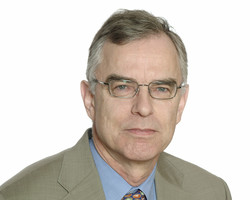From cure to prevention: focusing on lung health and tobacco

Hans Gilljam
Interview with Professor Hans Gilljam
Every cause must have its day, but Professor Hans Gilljam has dedicated most of his professional life to lung health. In an interview, he explained the intimate connections between lung health and tobacco control, and laid out his case for a smoke-free Sweden by 2025, which he firmly believes is possible.
Professor Gilljam, one of this year’s 6 European World No Tobacco Day awardees, is being recognized for his outstanding lifelong contribution to tobacco control. He explains that, as a lung physician, he dedicated the first half of his life to caring for, but often failing to cure, patients with grave smoking-related illnesses. Rather than spend the rest of his career attempting to cure the symptoms of tobacco use, Professor Gilljam turned to the heart of the problem: he decided to devote the rest of his career to tobacco prevention.
“I am convinced that making cigarette smoking a thing of the past is the fastest and safest way to decrease death rates from common diseases like lung cancer and chronic obstructive pulmonary disease,” he says.
Besides his international collaborative work and founding of the national quitline in Sweden 20 years ago, Professor Gilljam’s proudest achievement is his role in co-founding Doctors Against Tobacco in 1992. This world-renowned nongovernmental organization is dedicated to tobacco use prevention in Sweden.
He outlines Doctors Against Tobacco’s significance as an intellectual arena for collaboration on diagnosis, prevention and treatment, but also emphasizes its critical role in bridging the medical and political spheres of tobacco control. Doctors Against Tobacco acts as an opinion catalyst, lobbying physicians to pressure the Government and policy-makers to act on lung health. Through the organization, Swedish civil society has a voice on lung health and has affected real change in tobacco control legislation.
The WHO Framework Convention on Tobacco Control (FCTC) has been a guiding tool throughout Professor Gilljam’s career, and he views the full implementation of this powerful treaty as the most direct route to lung health. He has called on the Government to implement more of the evidence-based tools suggested in the WHO FCTC to reach the goal of a tobacco-free Sweden.
In the world of tobacco control, “tobacco-free” refers to a prevalence rate of daily smokers of less than 5%. In 2012, Sweden set 2025 as its tobacco-free target. Professor Gilljam believes that this is now within reach: the 2018 national survey indicated a prevalence rate of around 7% among both men and women. This shift has come about thanks to the hard work of politicians, research organizations and Doctors Against Tobacco.
Professor Gilljam believes Sweden can aim even higher than tobacco-free by 2025. His optimism is based on the country’s great strides forward in the area of tobacco control, for which he can take some credit. By promoting tobacco control as one of the fundamental routes to lung health and ensuring that it is high on the legislative agenda, Professor Gilljam has saved lives across the country and put Sweden on the tobacco control map.



